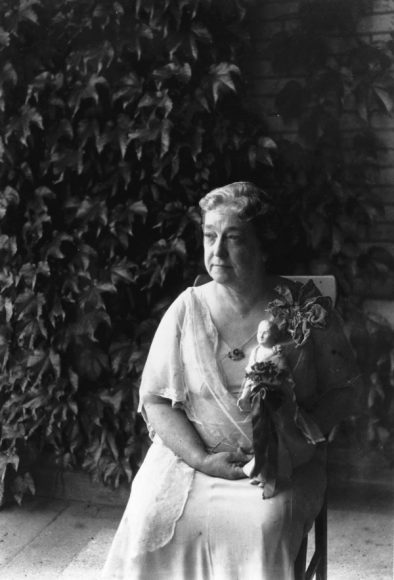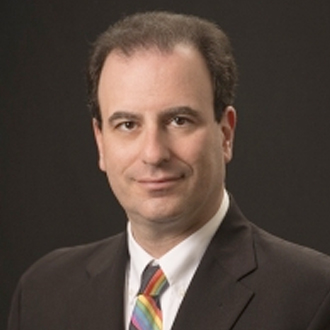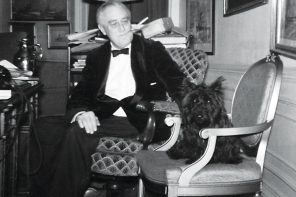During this month, members of the American Legion will fan out across the country distributing poppies made from fabric and crepe paper in exchange for donations to support the organization’s veterans relief program. Using the poppy as the symbol of remembrance for servicemen was the idea of a sensitive-yet-indefatigable woman who made it her mission to ensure the heroes of the battlefield would not be forgotten in death or ignored in life.
Moina Michael was born in 1869 in Good Hope, Georgia. Her father, John Michael Marion, was a cotton plantation owner and a veteran of the Confederate Army. As a young girl, she received an education at Braswell Academy in neighboring Morgan County and at the Martin Institute in Jefferson, Georgia.
During the hardship of the post-Civil War years, Michael’s hometown was unable to afford its own schoolteacher. At the urging of her mother, the 15-year-old took on the task of teaching youngsters. Michael devoted her life to teaching at schools across Georgia, offering instructions in settings that ranged from a simple small-town church school to a teacher’s college called the State Normal School. She left Georgia to complete her own education at Columbia University in New York in 1912-13.
Michael was on a vacation tour of Europe in the summer of 1914 when World War I broke out. Her traveling party made its way from Germany to Rome where Michael volunteered to work with the American Committee at the U.S. Embassy to assist her fellow countrymen stranded in Europe who were trying to get back home. In her first two weeks in Rome, Michael helped to collate information for more than 12,000 Americans. She returned home and resumed teaching at the Normal School, later transferring to the University of Georgia in Athens — no mean feat for a female academic in that unenlightened era.
When the nation entered World War I in April 1917, Michael was eager to be part of the war effort and sought to volunteer with the YMCA Overseas War Workers. At 47 years old, she was considered too senior to be sent to the front line, but through perseverance she was called to New York to assist at the training headquarters set up at Columbia University.
In November 1918, prior to the armistice that brought the war to a close, Michael was on duty at the Twenty-fifth Conference of the Overseas YMCA in New York. To pass the time, she thumbed through a copy of Ladies’ Home Journal that included a copy of the poem “We Shall Not Sleep!” by Col. John McCrae, a Canadian physician who was killed in battle. (The poem is now known as “In Flanders Fields.”)
As she recalled in her 1941 autobiography, “The Miracle Poppy,” Michael felt McCrae’s poetry was “a full spiritual experience. It seemed as though the silent voices again were vocal, whispering, in sighs of anxiety unto anguish, ‘To you from failing hands we throw the Torch; be yours to hold it high. If ye break faith with us who die we shall not sleep, though poppies grow in Flanders Fields.’ Alone, again, in a high moment of white resolve I pledged to KEEP THE FAITH and always to wear a red poppy of Flanders Fields as a sign of remembrance and the emblem of ‘keeping the faith with all who died.’”
Michael rushed from the conference and went to the Wanamaker’s department store, where she bought two dozen small silk red four-petaled poppies that resembled the Flanders poppies of McCrae’s poem. She returned to the conference and asked the attendees to wear them in tribute of the American casualties of the just-concluded war. The attendees followed her request and the first remembrance poppies were worn in tribute to the fallen servicemen.
Michael returned to the University of Georgia in 1919, wearing the silk poppy. She was cognizant of the struggles that wounded veterans faced in returning from service and she focused her teaching on helping the ex-soldiers acclimate to civilian life. Since relatively few companies were eager to hire disabled veterans, she petitioned the American Legion to have them assemble poppies for distribution, which could be used for fundraising to help veterans in need. She encouraged people to wear the poppy, which was significant because many Americans were eager to put the war behind them and not be reminded of its carnage and casualties.
The American Legion adopted the poppy as its symbol of remembrance in 1920, with the American Legion Auxiliary following suit in 1921. Veterans associations in Canada, Great Britain, Australia and New Zealand took note of Michael’s work and adapted the poppy as their memorial symbol in 1921. Even the British royal family took its cue from Michael: Throughout her reign, Queen Elizabeth II has worn a bright ceramic red poppy each Nov. 11 during the ceremony at The Cenotaph in London honoring the British war dead.
According to Ann Fournier, secretary for the American Legion Auxiliary — Department of Massachusetts, between 5 million and 10 million poppies are distributed annually, which generate more than $1 million annually to help finance health care, housing and occupational training for disabled and hospitalized veterans. “We don’t sell them,” she adds. “We distribute them and ask for a donation.”
Celebrated in her life as “The Poppy Lady” for her advocacy of improving the lives of veterans, Michael passed away in May 1944 in the age of 74. In 1948, on the 30th anniversary of her decision to start the poppy campaign, the U.S. Postal Service honored her with a bright red and white commemorative stamp. The eye-catching stamp was one of the most popular issues of its era and reaffirmed Michael’s place in history.
Today, the American Legion Auxiliary keeps alive Michael’s story in the promotion of its poppy program. A Georgia nonprofit called The Moina Michael Poppy Project began in 2013 and hosts seminars for schools and historical societies on Michael’s life and mission.
After Michael read the McCrae poem, she penned her own poem to guarantee that the slain of World War I would not be forgotten. Her glorious mission could best be summed up by her own verse: “We cherish too, the Poppy red / That grows on fields where valor led, / It seems to signal to the skies / That blood of heroes never dies.”
For more, visit moinamichaelpoppyproject.com.





